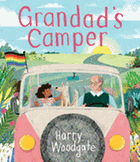
There are some fine picture books revolving around a child's experience of loss, but there aren't many designed to help kids understand someone else's grief. With the affecting Grandad's Camper, Harry Woodgate takes a step toward reducing that deficit. To do so, they enlist a groovy camper as a symbol of both the past and moving on.
"Every summer, I go to stay at my grandad's house by the sea," reports a girl who appears to be about eight. "My favorite thing to do," she explains, "is snuggle up on the sofa and listen as Grandad tells me about all of the amazing places he and Gramps would explore. One of the high points of Grandad and Gramps's life together was a road trip: 'We saw lots of different kinds of homes.... But we were happy with our little home on wheels.' " When the girl asks Grandad why he's no longer out there having adventures, he says, "Since Gramps died, I just don't feel like it." This gives her an idea.
The girl's narration doesn't sound like that of a child, and at times the dialogue seems mechanical. Nevertheless, the book has the potential to be an effective tool for teaching empathy, and the intergenerational bond at the story's center is a heartstrings puller. The art throughout Grandad's Camper is dashing, the layouts somehow chockablock but never too busy. Geometric elements create an orderliness that allows for the book's boundless palette. When Grandad reflects on his life with Gramps, his memories take the visual form of vignettes showing the younger versions of the men--Grandad white, Gramps with the same brown skin tone as the girl--on the road, at home or enjoying the great outdoors, always delighted to be together. --Nell Beram, freelance writer and YA author

